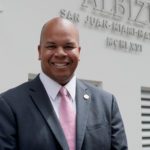N
atalie J. Padilla is a psychologist and founder of Psi.Qi. She is an alumnus of the Master of Psychological Counseling and the PsyD program in Psychological Counseling at Albizu University.

Psychologist and founder of Psi.Qi
“Currently, I work individual and couple psychotherapeutic processes for adults. I am also a Trauma Sensitive Yoga – Trauma Center (TSY-TC) facilitator and a professional Reiki practitioner.
One of the skills that most impacted my process at Albizu, both professionally and personally, was the support network during my professional and personal development, the compartmentalization to manage life and academic processes simultaneously, and the humbleness to both learn and ask for support. From Albizu, its faculty, and my colleagues, I acquired a humanized and diverse perspective of health professionals. This perspective also extends to everyone who comes to my office. In addition, if I had to talk about some specific and personal lessons, I would mention the realization that with effort and determination, one can live a worthwhile and meaningful life. We can reach those goals by paying attention to other valuable personal areas.
In my professional practice, I seek to genuinely connect with my clients, create relationships of emotional intimacy, normalize vulnerability and the full range of emotions, and provide safe support spaces. I am passionate about seeing how the spark ignites in my clients as they gain control of their agency and their processes. I am passionate when my clients connect with themselves and their behaviors, empowering themselves in their recovery process.
I see people, human beings, contexts, life histories, and generations. I also know the impact of social-political processes and complex traumas. I pay attention to their intersectionality. In my professional approach, I work with the symptoms, but I pay close attention to these details and promote sensitivity, empathy, and self-compassion. Finally, I attend to my clients both from the psychological perspective and the client’s corporeality. I do integrative practices, regular mind-body practices, and exercises like Trauma Sensitive Yoga.
My clients often ask me how this way of living, communicating, or relating is sustainable if others do not connect or see life like this. It is precisely there that I reaffirm that from one person to another and through vicarious processes, we are making a difference, healing and sustaining ourselves in community.”






























